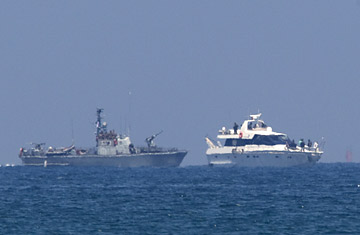
An Israeli military vessel escorts one of the boats in a Gaza-bound aid flotilla to the southern Israeli navy port of Ashdod on May 31, 2010, after navy seals stormed a boat carrying humanitarian aid to the Gaza Strip against an Israeli blockade, in a raid which killed several passengers.
(2 of 2)
"The commandos were equipped with handguns but were told they should only use them in the face of life-threatening situations. When they came down from the chopper, they kept on shouting to each other 'don't shoot, don't shoot,' even though they sustained numerous blows," he wrote.
The commandeered ships were brought into Ashdod port several hours later, where passengers were interrogated by interior ministry officials and police who said most would be deported but they would arrest any terrorist suspects.
Danny Ayalon, Israel's deputy foreign minister, claimed the IHH, the Turkish group operating the Mava Marmari, had "well-documented ties to Al-Qaeda and international jihad."
"We told them they would not be allowed to break the blockade," Ayalon said. "They were trying to create a free corridor of terrorist supplies to Gaza and to Hamas."
International Outrage
Israel's explanations for the pre-dawn assault failed to head off a growing diplomatic incident. Turkey accused Israel of "targeting innocent civilians", quickly withdrew its ambassador to Israel and called for an emergency United Nations security council meeting. Prime Minister Recep Tayyip Erdogan cut short his trip to Latin America to return to Ankara.
In Istanbul, a crowd tried to storm the Israeli Consulate. North of Jerusalem, Palestinians hurled bottles and stones at Israeli soldiers. In Jordan, hundreds urged their government to follow Turkey's lead and cut ties with Israel. In Tehran, dozens of angry students pelted U.N. offices with stones and eggs. Protests also broke out across Europe: riot police using tear gas drove back hundreds of protesters outside the Israeli Embassy in Paris, while demonstrators also took to the streets in Rome, Sweden, Norway and elsewhere.
The EU and UN both called for an end to Israel's blockade on Gaza.
Catherine Ashton, the EU foreign policy chief, demanded a "full inquiry" into the incident and called for "an immediate, sustained and unconditional opening of the crossing for the flow of humanitarian aid, commercial goods and persons to and from Gaza." White House press secretary Bill Burton issued a statement saying that the United States "deeply regrets the loss of life and injuries sustained" in the raid and that the Administration is "working to understand the circumstances surrounding this tragedy."
"Israel appears to have lost its mind," says Soli Ozel, professor of international relations at Istanbul's Bilgi University. "This incident happened in international waters, there is nothing that can explain it." Ertugrul Ozkok, chief columnist for the Turkish daily Hurriyet, posted an emotional online editorial, saying he couldn't wait for the paper to come out the next day: "There is no aspect to this action by the Israeli government that is acceptable or excusable," he wrote. "I never expected this lunacy, this cruelty. As someone who lives in this region, it makes me afraid."
There was fury also among Israel's 1.6-million-strong Arab minority, whose leaders met in emergency session and declared a three-day general strike — a prelude in the past to rioting that has turned violent. Hamas claimed a moral victory against Israeli "piracy" while Palestinian President Mahmoud Abbas denounced the assault as a "massacre," declaring three days of official mourning and calling for an urgent meeting of the Arab League, expected to be held Wednesday. Palestinian demonstrators took to the streets of Ramallah and Bethlehem to denounce the Israeli actions.
Israeli police were placed on high alert, fearing that a wave of demonstrations could plunge the country back into intifada-style violence. In Nazareth, Israel's largest Arab city, youths took to the streets in spontaneous protest as the news broke in the early morning. Arab students also staged protests at Haifa University and the Hebrew University in Jerusalem. There was a heavy police presence in Wadi Ara, the artery connecting many Arab towns and villages in the Galilee, and security forces restricted access to the Al-Aqsa Mosque compound in the Old City of Jerusalem, a frequent flashpoint for clashes.
—With reporting by Pelin Turgut and Associated Press
